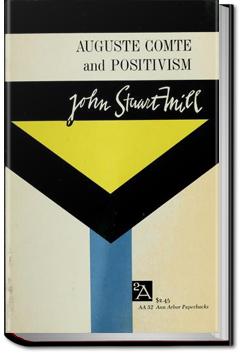UNLIMITED Audiobooks and eBooks
Over 40,000 books & works on all major devices
Get ALL YOU CAN for FREE for 30 days!
Auguste Comte and Positivism
John Stuart Mill
Book Overview:
Part 1 lays out the framework for Positivism as originated in France by Auguste Comte in his Cours de Philosophie Positive. Mill examines the tenets of Comte's movement and alerts us to defects. Part 2 concerns all Comte's writings except the Cours de Philosophie Positive. During Comte's later years he gave up reading newspapers and periodicals to keep his mind pure for higher study. He also became enamored of a certain woman who changed his view of life. Comte turned his philosophy into a religion, with morality the supreme guide. Mill finds that Comte learned to despise science and the intellect, instead substituting his frantic need for the regulation of change.
Part 1 lays out the framework for Positivism as originated in France by Auguste Comte in his Cours de Philosophie Positive. Mill examines the tenets of Comte's movement and alerts us to defects. Part 2 concerns all Comte's writings except the Cours de Philosophie Positive. During Comte's later years he gave up reading newspapers and periodicals to keep his mind pure for higher study. He also became enamored of a certain woman who changed his view of life. Comte turned his philosophy into a religion, with morality the supreme guide. Mill finds that Comte learned to despise science and the intellect, instead substituting his frantic need for the regulation of change.
How does All You Can Books work?
All You Can Books gives you UNLIMITED access to over 40,000 Audiobooks, eBooks, and Foreign Language courses. Download as many audiobooks, ebooks, language audio courses, and language e-workbooks as you want during the FREE trial and it's all yours to keep even if you cancel during the FREE trial. The service works on any major device including computers, smartphones, music players, e-readers, and tablets. You can try the service for FREE for 30 days then it's just $19.99 per month after that. So for the price everyone else charges for just 1 book, we offer you UNLIMITED audio books, e-books and language courses to download and enjoy as you please. No restrictions.
Try now for FREE!

"Love your service - thanks so much for what you do!"
- Customer Cathryn Mazer
"I did not realize that you would have so many audio books I would enjoy"
- Customer Sharon Morrison
"For all my fellow Audio Book & E-Book regulars:
This is about as close to nirvana as I have found!"
- Twitter post from @bobbyekat



Community Reviews
Interesting read
Great book if you're into the origins of sociology. It begins with an overview of how man has explained the natural phenomena. It started with fetishism, then polytheism, monotheism, metaphysics and finally positivism which uses empirical data to prove the natural laws. Comte used the methodology of
Much fun!
John Stuart Mill's "essay" provides an honest account of Comte's principal works in a relatively succinct form. Mill doesn't shy away from criticizing Comte's absurd notions of "regeneration of human society," through which the institution of "Positive Religion" would be instituted for all of humani
This is a relatively engaging summary of Comte's philosophical, scientific, political and religious positions. It also contains Mil's criticism of Comte's positions. The account often also gives a sense of Mill's position on issues like the proper definition of science as he contrasts his ideas with
The golden rule of morality, in M. Comte's religion, is to live for others, “vivre pour autrui.”
All education and all moral discipline should have but one object, to make altruism (a word of his own coining) predominate over egoism.
A very interesting introduction to Comte, an eccentric genius. The comments seem sharp and unbiased.
This is an outstanding and essential work that should be on the bookshelf of anyone interested in philosophy, psychology, sociology and human development
Auguste Comte is so bad... J.S. Mill seems to admire him in many ways, but also criticizes the more obviously weak points of the philosophy. Comtean Positivism reeks of narcissism, suffers from an inability to abstract from a western cultural context, an inability to abstract from a 19th century con